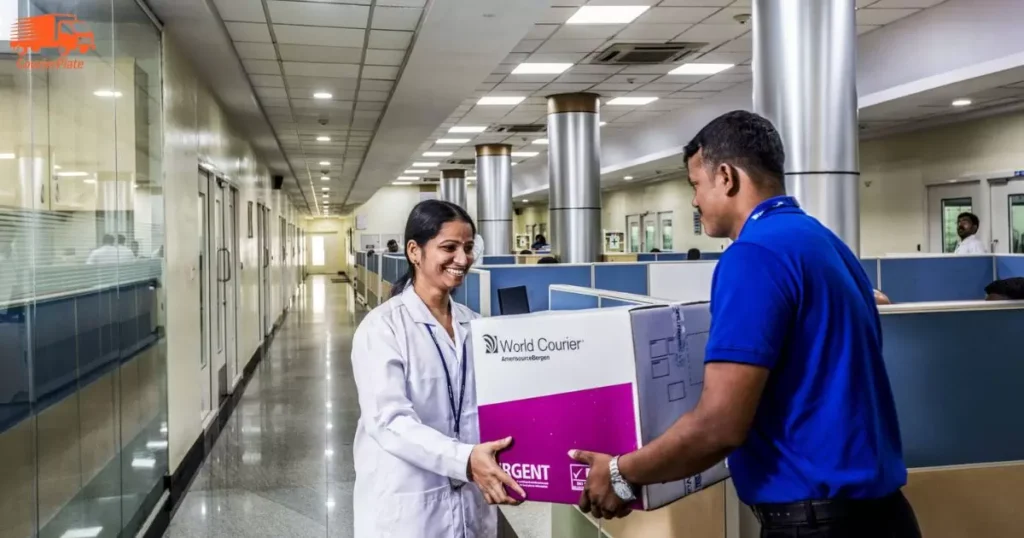A medical courier transports medical supplies and specimens between healthcare facilities. They ensure timely and secure delivery of critical materials for patient care.
Are you interested in a flexible career with essential responsibilities? “How to Become A Medical Courier?” outlines the straightforward steps to enter this field. From obtaining a driver’s license to securing certifications, this guide offers a clear pathway to a rewarding job as a courier.
Looking to embark on a career as a medical courier? The process is simpler than you think! Begin by ensuring you have a valid driver’s license and a clean driving record. Consider obtaining relevant certifications and completing any necessary training programs. With dedication and the right qualifications, you can start delivering vital medical supplies and specimens in no time.
Understanding the Role of Medical Courier
Medical courier plays a crucial role in the healthcare system. They are responsible for transporting medical specimens, supplies, and equipment between healthcare facilities, laboratories, and clinics. Their primary goal is to ensure timely and secure delivery, maintaining the integrity and safety of the items being transported.
What is a Medical Courier?
A medical courier is a professional who specializes in the transportation of medical materials within the healthcare industry. They handle a variety of items including blood samples, diagnostic specimens, pharmaceuticals, and medical equipment. Their job is to ensure that these items reach their destinations safely and efficiently, adhering to strict protocols and regulations.
What Does a Medical Courier Do?
Medical courier’s main duty is to pick up and deliver medical items from one location to another. They follow designated routes and schedules, often driving specialized vehicles equipped with temperature-controlled compartments.
They may be required to handle paperwork, maintain logs of deliveries, and communicate effectively with healthcare personnel to ensure smooth operations.
Qualifications and Skills Required to Become a Medical Courier

To become a courier, certain qualifications and skills are essential. A valid driver’s license and a clean driving record are typically required. Attention to detail, reliability, and strong communication skills are important attributes for success in this role.
What are the Key Skills and Qualifications Required to Become a Medical Courier?
Key skills and qualifications for aspiring medical couriers include a valid driver’s license, a clean driving record, and the ability to follow strict protocols and regulations. Strong organizational skills, attention to detail, and reliability are also essential. Some employers may require additional certifications in medical transportation to ensure the safe handling of sensitive materials.
How does your driving history affect your chances of becoming a medical courier?
Your driving history significantly impacts your eligibility to become a courier. A clean driving record with no major infractions or accidents is typically required.
Employers prioritize safe and responsible drivers to ensure the secure and timely delivery of medical supplies and specimens. Any history of reckless driving or traffic violations may limit your opportunities in this field.
Read more: Departed from airport of origin
Education and Training for Medical Couriers

Formal education beyond high school is not always required to become a courier. However, possessing a high school diploma or equivalent is typically necessary.
On-the-job training is common, where new couriers learn protocols, safety procedures, and the proper handling of medical materials. Some employers may offer additional training programs or require certification in medical transportation.
How to become a certified medical courier?
Becoming a certified medical courier involves completing specific training programs or courses focused on medical transportation and handling procedures.
These programs cover topics such as specimen handling, patient privacy laws (like HIPAA), and safe driving practices.
After completing the training and passing any required exams, individuals receive certification that demonstrates their competence and knowledge in the field.
What are some common questions asked in medical courier interviews?
During medical courier interviews, candidates can expect questions about their driving history, experience with handling sensitive materials, and familiarity with transportation regulations. Employers may also inquire about their understanding of patient privacy laws and their ability to follow strict protocols. Questions about availability, reliability, and problem-solving skills are common to assess a candidate’s suitability for the role.
Licensing and Certification for Medical Couriers

While specific licensing requirements vary by jurisdiction, many medical couriers need a commercial driver’s license (CDL) to operate. Certification in medical transportation may be required by some employers or regulatory agencies. These certifications ensure that couriers are trained to handle medical materials safely and adhere to industry standards.
Is it necessary to have a bachelor’s degree to start your own medical courier business?
A bachelor’s degree is not typically required to start a courier business. However, having a degree in business administration or a related field can provide valuable knowledge and skills for entrepreneurship. Successful business ownership often relies more on practical experience, industry knowledge, and effective management skills.
How much money can an average medical courier earn in California?
The average earnings of medical couriers in California can vary based on factors such as experience, location, and employer. On average, medical couriers in California can earn between $30,000 to $40,000 per year, according to industry data.
However, earnings may vary significantly depending on the specific job responsibilities, the volume of deliveries, and any additional certifications or specialized skills the courier may possess.
Finding Job Opportunities as a Medical Courier

Finding job opportunities as a courier involves exploring various avenues. You can start by checking job boards and career websites for openings in healthcare facilities, laboratories, and courier companies.
Networking with professionals in the healthcare industry and attending job fairs or industry events can also help you discover potential opportunities. Reaching out directly to healthcare facilities and courier services in your area may uncover unadvertised positions.
Read more: DHL Shipment On Hold
How can you find potential clients for your business?
To find potential clients for your medical courier business, consider networking with healthcare providers, clinics, hospitals, and laboratories in your area. Establishing relationships with these entities can lead to referral opportunities and contracts for your services. Utilizing online platforms, such as social media and professional networking sites, can also help you connect with potential clients and showcase your services.
What will be the cost of starting a medical courier business?
The cost of starting a courier business can vary depending on several factors, including the scale of operations and the equipment required. Common expenses may include vehicle purchase or leasing, insurance premiums, licensing and certification fees, marketing expenses, and operational costs such as fuel and maintenance.
It’s essential to create a comprehensive business plan and budget to accurately estimate the initial investment needed to launch your medical courier business.
Job Duties and Responsibilities of a Medical Courier

- Transport medical specimens, supplies, and equipment between healthcare facilities, laboratories, and clinics.
- Ensure timely and secure delivery of sensitive materials, maintaining integrity and confidentiality.
- Adhere to strict protocols and regulations governing the handling and transportation of medical items.
- Follow designated routes and schedules while driving specialized vehicles equipped with temperature-controlled compartments.
- Handle paperwork, maintain logs of deliveries, and communicate effectively with healthcare personnel.
- Verify and confirm the accuracy of items being transported, ensuring proper documentation and labeling.
- Respond promptly to any issues or concerns during transportation, taking appropriate action to resolve them.
- Maintain cleanliness and organization of vehicles and equipment, ensuring safe and efficient operations.
- Uphold high standards of professionalism and customer service, representing the company positively during interactions with clients and healthcare professionals.
What types of items do medical couriers typically transport?
| Types of Items | Description |
| Medical Specimens | Samples of blood, urine, tissue, or other bodily fluids collected for diagnostic testing or analysis. |
| Pharmaceuticals | Samples of blood, urine, tissue, or other bodily fluids are collected for diagnostic testing or analysis. |
| Medical Equipment | Devices, instruments, or machinery used in medical procedures or patient care, such as medical devices, monitors, or infusion pumps. |
| Laboratory Supplies | Materials and consumables used in laboratory testing and analysis, including reagents, slides, and culture media. |
| Diagnostic Kits | Test kits and reagents used for diagnostic testing, such as rapid antigen tests or molecular diagnostic kits for infectious diseases. |
| Patient Records | Confidential patient information, medical records, and documentation required for consultations, treatments, or procedures. |
| Organ and Tissue Samples | Specimens collected for transplant procedures or research purposes, including organs, tissues, and donor samples. |
What are the most common mistakes made by medical courier companies?
Medical courier companies, while essential in the healthcare system, often encounter common mistakes that can impact their efficiency and reliability. Here’s a brief overview:
- Poor Communication: Inadequate communication between couriers and healthcare facilities can lead to delays, missed pickups, or incorrect deliveries.
- Lack of Training: Insufficient training in handling medical materials and following safety protocols can result in the mishandling of specimens or equipment, compromising their integrity.
- Failure to Adhere to Regulations: Ignorance or neglect of regulations governing the transportation of medical items may result in fines, legal issues, or loss of credibility.
- Inadequate Vehicle Maintenance: Neglecting routine maintenance of vehicles can lead to breakdowns or temperature control failures, jeopardizing the integrity of medical specimens.
- Insufficient Documentation: Inaccurate or incomplete documentation of deliveries may result in confusion, billing errors, or difficulty tracking packages.
- Poor Route Planning: Inefficient route planning or scheduling can lead to delays, increased fuel costs, and decreased customer satisfaction.
- Inconsistent Quality Control: Lack of oversight or quality control measures may result in inconsistent service standards and customer dissatisfaction.
- Failure to Address Customer Concerns: Ignoring or mishandling customer complaints or concerns can damage the company’s reputation and lead to loss of business.
- Inadequate Security Measures: Insufficient security protocols for handling sensitive materials may increase the risk of theft, loss, or tampering during transit.
- Limited Tracking and Monitoring: Inadequate tracking systems or monitoring tools may hinder the real-time visibility of shipments, making it challenging to address issues promptly.
Addressing these common mistakes through proper training, effective communication, and stringent quality control measures can help medical courier companies enhance their service quality and reliability in the healthcare industry.
Tips for Excelling as a Medical Courier

Excelling as a courier involves more than just delivering packages—it requires attention to detail, professionalism, and commitment to quality service. Here are some tips to help you excel in this role:
- Master Your Routes: Familiarize yourself with your delivery routes to ensure timely and efficient deliveries. Use navigation tools to navigate traffic and avoid delays.
- Prioritize Safety: Always prioritize safety when handling medical specimens and equipment. Adhere to safety protocols and regulations to minimize the risk of accidents or contamination.
- Maintain Professionalism: Present yourself professionally at all times. Dress appropriately, communicate politely with healthcare staff, and handle packages with care.
- Attention to Detail: Pay close attention to package labels, handling instructions, and delivery requirements. Ensure accuracy and precision in every aspect of your work.
- Effective Communication: Maintain clear and open communication with your dispatcher, colleagues, and healthcare personnel. Provide updates on delivery status and address any concerns promptly.
- Handle Packages Carefully: Handle medical specimens and equipment with utmost care to avoid damage or contamination. Use proper packaging and handling procedures to maintain specimen integrity.
- Stay Organized: Keep your vehicle and delivery supplies well-organized to streamline your workflow. This includes maintaining cleanliness, arranging packages logically, and replenishing supplies as needed.
- Problem-Solving Skills: Develop strong problem-solving skills to address unexpected challenges or issues during deliveries. Stay calm under pressure and find practical solutions to overcome obstacles.
- Customer Service Excellence: Provide exceptional customer service to healthcare facilities and patients. Be responsive to inquiries, address concerns promptly, and strive to exceed expectations.
- Continuous Improvement: Continuously seek opportunities for learning and improvement. Stay updated on industry trends, attend training sessions, and seek feedback to enhance your skills and performance as a courier.
What are the benefits of becoming a medical courier?
Here are the benefits of medical courier:
Flexible Work Schedule
- Medical courier roles often offer flexible hours, allowing individuals to balance work with personal commitments.
Competitive Pay
- Many medical courier positions offer competitive wages and the potential for overtime pay, providing financial stability.
Entry-Level Opportunity
- Becoming a courier typically requires minimal education and experience, making it accessible to individuals from diverse backgrounds.
Exposure to the Healthcare Environment
- Medical couriers gain exposure to the healthcare industry, fostering opportunities for networking and career advancement.
Independence
- Medical couriers often work independently, allowing for autonomy and decision-making in managing deliveries and routes.
Contribution to Healthcare
- Medical couriers play a vital role in facilitating the timely delivery of medical specimens, supplies, and equipment, contributing to patient care and treatment.
Physical Activity
- The role of a courier involves physical activity, such as lifting and transporting packages and promoting a healthy and active lifestyle.
Job Satisfaction
- Delivering critical medical items and contributing to the smooth operation of healthcare facilities can be rewarding, leading to job satisfaction.
Skill Development
- Medical couriers develop valuable skills in time management, organization, communication, and problem-solving, enhancing their professional capabilities.
Career Growth Opportunities
- With experience, medical couriers may advance to supervisory roles, pursue certifications, or transition to other positions within the healthcare industry.
How Much Does a Medical Courier Earn on Average Per Year?
The average annual earnings for a courier can vary depending on factors such as location, experience, and employer. On average couriers can expect to earn between $30,000 to $40,000 per year in the United States. However, those with specialized skills or who work in high-demand areas may earn higher salaries. While entry-level positions may offer lower starting wages.
Despite variations in pay many medical couriers find the compensation to be competitive, especially considering the relatively low barriers to entry for this field. Opportunities for overtime pay, bonuses, and benefits packages may further enhance earnings potential for medical couriers. It makes it a financially rewarding career path for individuals seeking stability and flexibility in their employment.
Challenges Faced by Medical Couriers and How to Overcome Them

Medical couriers often face challenges such as strict delivery deadlines, navigating through traffic, and ensuring the safe handling of sensitive medical materials. To overcome these challenges, they can utilize efficient route planning, and communicate effectively with dispatchers. Prioritize safety protocols to ensure timely and secure deliveries.
Is it hard to become a medical courier?
Becoming a courier typically doesn’t require extensive education or experience, making it accessible to many individuals. While the job may involve physical demands and adherence to strict protocols, with proper training and attention to detail, aspiring couriers can successfully enter and excel in the field.
How long does it take to become a medical courier?
The time it takes to become a courier can vary depending on individual circumstances and employer requirements. In general, obtaining necessary licenses and certifications, completing training programs, and securing employment can take a few weeks to a few months. However, with dedication and commitment, individuals can start their careers as medical couriers relatively quickly.
Working Conditions and Salary Expectations for Medical Couriers
Medical couriers often work in fast-paced environments, driving long distances and handling time-sensitive deliveries. They may encounter various weather conditions and traffic challenges. While salaries vary based on factors like location and experience, medical couriers can typically expect to earn between $30,000 to $40,000 per year, with the potential for overtime pay and benefits.
What are the legalities you need to start a medical courier?
To start a courier business, it’s essential to comply with legal requirements and regulations governing the transportation of medical supplies and specimens. This includes obtaining proper licenses and permits, adhering to healthcare privacy laws like HIPAA, and ensuring vehicles meet safety standards. Liability insurance is often required to protect against potential risks and liabilities.
How to transport medical supplies?
Transporting medical supplies requires careful handling and adherence to safety protocols. Items should be securely packaged to prevent damage or contamination during transit.
Temperature-sensitive materials may require specialized containers or refrigeration units to maintain proper storage conditions. Couriers must follow established procedures for loading, unloading, and documenting shipments to ensure accuracy and integrity throughout the transportation process.
Advancement Opportunities in the Field of Medical Courier Services

In the field of medical courier services, there are numerous opportunities for career advancement and professional growth. As individuals gain experience and expertise in the industry, they may explore various paths to progress their careers:
- Supervisory Roles: Experienced medical couriers may transition into supervisory or managerial positions, overseeing teams of couriers and coordinating logistics operations.
- Specialized Training: Pursuing additional training and certifications in areas such as hazardous materials handling, cold chain logistics, or medical specimen transportation can open doors to specialized roles within the field.
- Cross-Functional Roles: Medical couriers may leverage their experience to transition into related roles within the healthcare industry, such as supply chain management, logistics coordination, or inventory management.
- Career Development Programs: Many medical courier companies offer career development programs and opportunities for advancement, providing employees with training, mentorship, and support to advance their careers.
- Entrepreneurship: Ambitious individuals may choose to start their medical courier businesses, offering specialized services and expanding their operations to serve a broader clientele.
Future Outlook for the Medical Courier Industry
The future outlook for the medical courier industry appears promising, with continued growth and expansion expected in the coming years. As the healthcare sector evolves and technological advancements continue, the demand for efficient and reliable transportation of medical supplies and specimens is anticipated to increase.
With the rise of telemedicine and remote healthcare services, the need for timely delivery of medical materials to patients and healthcare facilities is becoming more critical than ever.
Moreover, advancements in logistics technology, such as route optimization software and temperature-controlled packaging solutions, are poised to enhance the efficiency and reliability of medical courier services.
As the aging population grows and healthcare services become more decentralized, the demand for medical courier services is projected to rise, creating new opportunities for job growth and career advancement within the industry.
Overall, the future of the medical courier industry is bright, with opportunities for innovation, expansion, and continued success on the horizon.
Safety Measures for Handling Sensitive Materials as a Medical Courier
| Safety Measures | Description |
| Proper Packaging | Ensure sensitive materials are securely packaged. |
| Temperature Control | Maintain appropriate temperature during transportation. |
| Handling Protocols | Follow strict protocols for handling and transport. |
| Protective Equipment | Use gloves and other protective gear when necessary. |
| Vehicle Maintenance | Regularly inspect and maintain vehicles for safety. |
| Security Measures | Implement measures to prevent theft or tampering. |
| Compliance with Regulations | Adhere to legal and regulatory requirements. |
| Emergency Preparedness | Be prepared to handle emergencies during transit. |
| Confidentiality | Maintain confidentiality and privacy of materials. |
| Training and Education | Provide training on safe handling and procedures. |
Best Practices for Maintaining Confidentiality in Medical Courier Services
Ensuring confidentiality is paramount in medical courier services to protect patient privacy and maintain trust. Here are some best practices:
- Secure Packaging: Use sealed containers and tamper-evident packaging for sensitive materials.
- Limited Access: Restrict access to authorized personnel only during transportation and storage.
- Confidentiality Agreements: Require employees to sign confidentiality agreements to uphold patient privacy.
- Data Encryption: Utilize encryption methods for electronic data transfer and communication.
- Secure Vehicles: Equip vehicles with locking mechanisms and alarms to prevent unauthorized access.
- Scheduled Routes: Plan routes to minimize exposure and reduce the risk of theft or interception.
- GPS Tracking: Install GPS tracking devices to monitor the location of vehicles and shipments in real time.
Importance of Excellent Customer Service in the Field of Medical Courier Services

Excellent customer service is crucial in the field of medical courier services as it directly impacts patient care and satisfaction. Couriers serve as the frontline representatives of healthcare facilities, interacting with patients, medical staff, and administrators. Providing prompt and courteous service not only reflects positively on the courier company but also contributes to the overall patient experience.
Patients rely on medical couriers to deliver critical supplies and specimens accurately and on time, making reliability and professionalism essential traits in this role. Exceptional customer service fosters trust and loyalty among healthcare providers and patients, leading to long-term relationships and repeat business.
Couriers who prioritize customer needs, communicate effectively and handle inquiries or concerns with care demonstrate dedication to their clients’ well-being. In a field where timeliness and accuracy are paramount, going above and beyond in customer service can make a significant difference in maintaining. The smooth operation of healthcare facilities and ensuring the delivery of quality patient care.
Reasons to Consider Becoming a Medical Courier
- Flexible Schedule: Medical courier roles often offer flexible working hours, allowing individuals to balance work with personal commitments and responsibilities.
- Entry-Level Opportunity: Becoming a courier typically requires minimal formal education or previous experience, making it accessible to individuals from diverse backgrounds.
- Competitive Pay: Many medical courier positions offer competitive wages and the potential for overtime pay, providing financial stability and earning potential.
- Contribution to Healthcare: Medical couriers play a crucial role in facilitating the timely and secure delivery of medical specimens, supplies, and equipment, contributing directly to patient care and treatment.
- Career Advancement: As individuals gain experience and expertise in the field, there are opportunities for career advancement, including supervisory roles, specialized training, and entrepreneurship within the medical courier industry.
Frequently Asked Questions
Can I Become a Medical Courier Even if I Have a Bad Record?
It’s possible to become a courier even with a bad record, but it may limit opportunities depending on the severity of the record and employer policies.
Can I Become a Medical Courier as a Full-Time Job?
Yes, many individuals work as medical couriers full-time, enjoying competitive pay and flexible scheduling options.
How Much Does it Cost to Become a Medical Courier?
The cost to become a courier varies but generally includes expenses such as obtaining licenses, certifications, and vehicle maintenance.
What are the Benefits of Becoming a Medical Courier?
Benefits of becoming a courier include flexible schedules, competitive pay, entry-level opportunities, contribution to healthcare, and potential career advancement.
What types of items do medical couriers typically transport?
Medical couriers typically transport items such as medical specimens, pharmaceuticals, medical equipment, laboratory supplies, patient records, organ samples, radiology films, medical waste, clinical trial materials, and diagnostic kits.
Conclusion
Becoming a courier outlines a straightforward path to entering the field of medical courier services. By following a few simple steps, individuals can embark on a rewarding career that offers flexibility, competitive pay, and opportunities for advancement. Through proper preparation and dedication, aspiring couriers can navigate the requirements and responsibilities of the role effectively.
In “How to Become A Medical Courier?”, obtaining a driver’s license and ensuring a clean driving record are foundational steps. Coupled with a commitment to professionalism and safety, these prerequisites set the stage for success in the industry. Pursuing certifications and training programs tailored to medical transportation further enhances one’s qualifications and marketability as a courier.
By prioritizing excellent customer service, adhering to legalities, and practicing safety measures, medical couriers can build trust with healthcare providers and patients alike. Ultimately, becoming a medical courier is not only a viable career option but also a meaningful opportunity to contribute to the healthcare community.

With a wealth of expertise spanning 6 years, I am a seasoned author in the realm of courier services information. My insights illuminate the intricacies of logistics and delivery solutions.








![Julia Boin JAV Bio, Net Worth, Career & Relation [2024 Complete Guide]](https://courierplate.com/wp-content/uploads/2024/11/Julia-Boin-JAV-Bio-Net-Worth-Career-Relation-2024-Complete-Guide-300x157.jpg)


